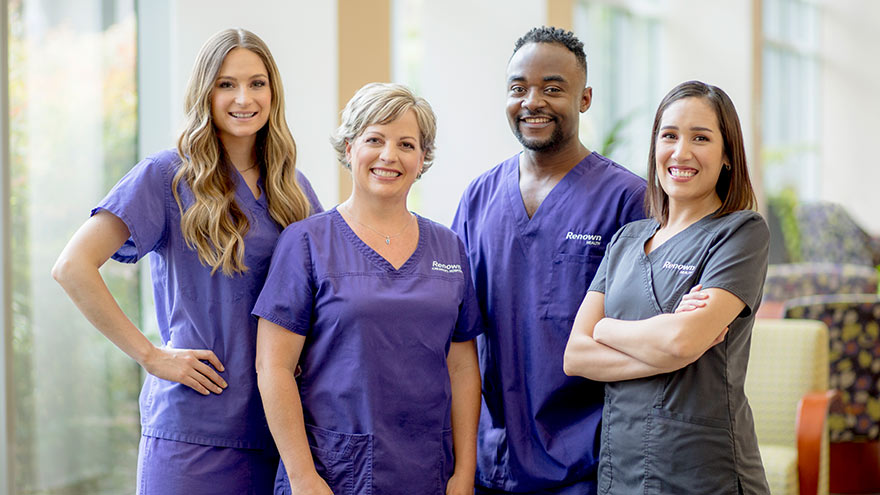Buscar
-
What's Special About Nursing at Renown Health
At Renown Health, we live by a core set of values. We are caring and compassionate. We demonstrate respect and integrity. We build relationships and collaborate with patients, families, clinicians and communities. We strive for excellence in all we do. Those values extend beyond patient care to the way we support our employees. We have worked hard to create an environment that empowers each person to learn, grow and thrive. Here are just a few examples of the ways we do that: Establishing a mentorship and leadership development program that provides insight, expertise and learning opportunities. Forming employee committees that improve health and well-being both at work and in our community that complement Renown’s work-life balance programs. Recognizing and rewarding team members for living our values. Providing paid time each quarter to support employee volunteerism and giving back to our community. Offering a variety of education programs, including tuition reimbursement, student loan repayment and a professional advancement bonus program, to help employees achieve their higher education goals. Hosting the largest Graduate Nurse Residency program in the state, which is also one of the largest in the nation. We strive to inspire, educate and help nurses shine, and in return, we know they will make a positive impact on the lives of their coworkers and the people we serve.
Read More About What's Special About Nursing at Renown Health
-
Understanding the Risks of Colon Cancer
Colorectal cancer is the second-deadliest cancer in the United States – largely because it goes undiagnosed. Dr. Christi Matteoni, Division Chief of Gastroenterology at Renown Health, discusses the symptoms and key screenings used to detect this type of cancer, along with risk factors and lifestyle changes that could affect the likelihood of getting the disease. What are some of the signs and symptoms of colorectal cancer? Many cases go undiagnosed because polyps can develop and become cancerous without any symptoms. Additionally, since colorectal cancer begins as small polyps, symptoms usually aren’t seen until later stages. This is why screenings are especially important. For those who do experience symptoms, the signs are often tied to your bowel habits. This can include changes such as constipation or diarrhea, narrow or dark stool, rectal bleeding, abdominal cramping, weakness and fatigue or unintended weight loss. What are some of the risk factors associated with this type of cancer? There are risk factors that can and cannot be controlled. Uncontrollable factors include age, race, personal and family histories as well as certain genetic syndromes that are important to discuss with your provider. This type of cancer is more common in people over the age of 50, African Americans and those of eastern European Jewish (Ashkenazi) descent. This type of cancer is also more common in those who have been diagnosed with polyps, Crohn’s disease, ulcerative colitis and long-term inflammatory bowel disease. important to discuss any of these risk factors with your provider. There are also lifestyle factors that can help reduce your risk. Factors include being overweight, having a diet high in red and processed meat, as well as smoking and consuming excess alcohol. Conversely, diets high in fruits and vegetables and a regular exercise routine can help lower your risk. If someone has some of these risk factors, what should they do? Do they need to get tested? If you are 45 or older and have any of these risk factors, we recommend you speak with your primary care provider about a formal colorectal risk assessment. The most common form of screening is colonoscopy. This screening lets your doctor examine the length of your colon, map out any potential problem areas and remove polyps. For most people, colonoscopies are recommended every 10 years starting at age 50. However, depending on your results and risk factors, you may need to begin screening sooner or get screened more frequently. What do diagnosis and treatment look like for this type of cancer? There are several diagnostic options for colorectal cancer, including endoscopic ultrasound; CT, MRI and PET scans; and biopsy and pathology reports. These technologies allow your doctor to get images of your colon and evaluate what treatment is needed, as well as how the treatment is progressing. Treatment varies for each individual working with their doctor. In the case of colorectal cancer treatment, the William N. Pennington Institute for Cancer offers chemotherapy, radiation therapy, surgery and clinical trials.

